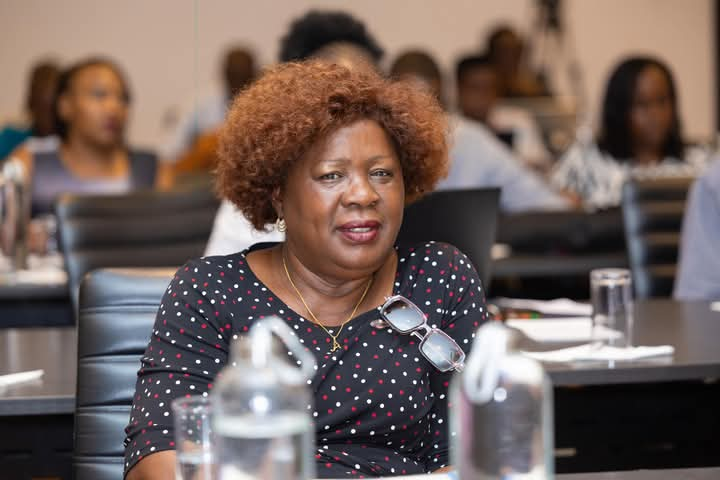News
Contributing to Housing Levy Doesn’t Guarantee Home Ownership, CS Wahome Says

Kenyans continue to express frustration after Lands and Housing Cabinet Secretary Alice Wahome reiterated that contributors to the housing levy will still need to pay for homes under the government’s Affordable Housing Programme.
The initiative, launched by President William Ruto to address Kenya’s housing deficit and create job opportunities, has been met with growing skepticism, particularly over its financing model.
Since 2023, salaried individuals have been required to contribute 1.5% of their monthly earnings, with employers matching that amount.
However, Wahome clarified that these deductions are not savings or deposits toward homeownership but are instead a tax used to fund construction.
“Contributing to the Housing Levy does not guarantee owning a house under Boma Yangu. The money you are contributing is not supposed to give you a house, it is helping us build the house. After that it is you who pays for that house,” Wahome said during a simulcast on Nation FM and NTV. “The model we are using is like a tenant purchase scheme, not a direct sale.”
Her remarks have drawn criticism from Kenyans who feel misled about the nature of the programme. Many expected their contributions to count toward eventual ownership, only to learn that acquiring a home still requires entering a rent-to-own agreement with payments spread over 30 years.
Public Outcry Over Levy’s Purpose
Social media reactions have been swift and critical, with users questioning why the deductions were framed as a path to homeownership rather than a tax. Some have likened the structure to a “Ponzi scheme,” while others have suggested that the government should have introduced a direct social housing model for low-income earners.
“What a bogus explanation! Use my money to build a house that is not going to be mine unless I buy it? That is the proper definition of a Ponzi scheme,” wrote one user, Linda Oriedo.
Antony Alexanderia Irungu echoed similar frustrations, stating, “Introducing an extra tax to build houses for sale to the same taxpayers was a horrible idea.”
Wahome defended the approach, arguing that if the government attempted to provide free housing for all those in need, it would be impossible to determine who qualifies.
“We need to be practical and understanding,” she said. “If the housing was open to everyone in need, I wouldn’t even begin construction because it would be difficult to determine who should get the homes.”
Delayed Units and Growing Skepticism
The Affordable Housing Programme, which aims to deliver one million homes by 2027, has also faced delays. Wahome admitted that the first batch of 4,888 units, initially scheduled for release in December 2024, will now be available by March 2025.
Under the Boma Yangu programme, homeowners will be given a 99-year lease title, which can be renewed by the government. Ms Wahome said the titles function like any other property title, allowing owners to sell or transfer their homes.
“Once you complete your payments, the house becomes yours. The title is transferable, meaning you can sell or pass it on to your family,” Ms Wahome explained.
In addition, she said, each applicant will only be eligible for one house to avoid unfair allocations and ensure that the initiative benefits as many Kenyans as possible.
Despite government assurances of transparency and fairness, concerns persist about the management of the housing levy. Recent reports indicate that billions collected through the tax remain idle in treasury bills rather than being used for active construction.
With the programme’s execution falling behind schedule and public trust in its structure eroding, Kenyans are left wondering whether the Affordable Housing Programme will genuinely serve its intended purpose or become another case of public funds mismanagement.
Kenya Insights allows guest blogging, if you want to be published on Kenya’s most authoritative and accurate blog, have an expose, news TIPS, story angles, human interest stories, drop us an email on [email protected] or via Telegram
-

 Grapevine1 week ago
Grapevine1 week agoAlleged Male Lover Claims His Life Is in Danger, Leaks Screenshots and Private Videos Linking SportPesa CEO Ronald Karauri
-

 Lifestyle2 weeks ago
Lifestyle2 weeks agoThe General’s Fall: From Barracks To Bankruptcy As Illness Ravages Karangi’s Memory And Empire
-

 Grapevine6 days ago
Grapevine6 days agoRussian Man’s Secret Sex Recordings Ignite Fury as Questions Mount Over Consent and Easy Pick-Ups in Nairobi
-

 Investigations3 days ago
Investigations3 days agoMulti-Million Dollar Fraud: Three Kenyans Face US Extradition in Massive Cybercrime Conspiracy
-

 Economy2 days ago
Economy2 days agoIran Demands Arrest, Prosecution Of Kenya’s Cup of Joe Director Director Over Sh2.6 Billion Tea Fraud
-

 Investigations2 weeks ago
Investigations2 weeks agoEpstein’s Girlfriend Ghislaine Maxwell Frequently Visited Kenya As Files Reveal Local Secret Links With The Underage Sex Trafficking Ring
-

 News2 weeks ago
News2 weeks agoState Agency Exposes Five Top Names Linked To Poor Building Approvals In Nairobi, Recommends Dismissal After City Hall Probe
-

 Business3 days ago
Business3 days agoA Farm in Kenya’s Rift Valley Ignites a National Reckoning With Israeli Investment
















